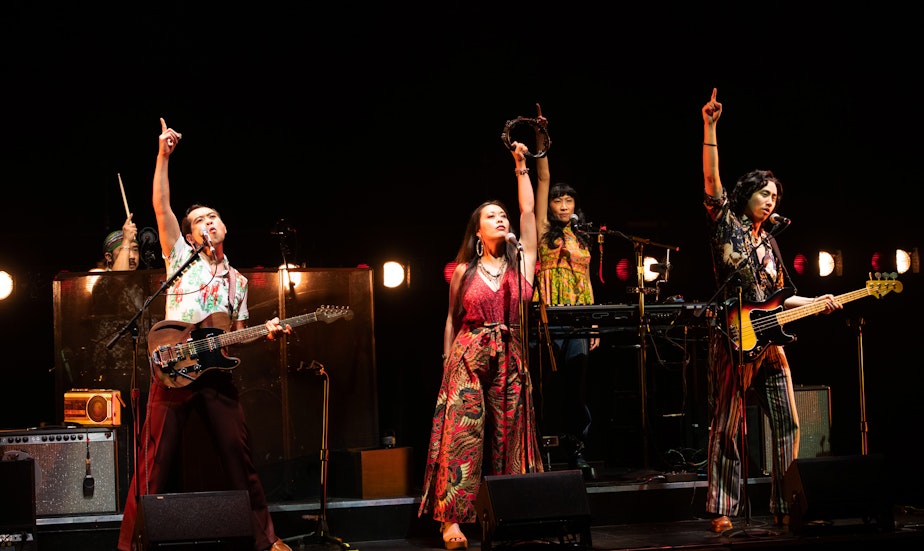'Cambodian Rock Band' explores collective trauma and history through music

This story of "Cambodian Rock Band" masterfully unfolds in a tale that features comedic beats, an epic soundtrack, and tender moments of love and understanding between a parent and child.
The play, now showing at ACT Theater in downtown Seattle, also introduces the audience to a horrific moment in history that they may not know much about — a genocide that claimed the lives of 2 million innocent people.
In 1978, a Cambodian refugee named Chum flees to America. He’s escaping the reign of the Khmer Rouge.
In 2018, Chum returns to Cambodia for the first time, and arrives unannounced to the hotel room of his daughter. She’s a lawyer fighting to bring justice to a former Khmer Rouge warlord, responsible for running a prison camp that killed 20,000 Cambodian people during the regime.
The story, as told in "Cambodian Rock Band," unfolds to the music of the Los Angeles-based band, Dengue Fever. Their music is unique — a combination of traditional Cambodian instrumentation and language, fused with influences of European, American, and Latin American rock that was imported into Cambodia in the 1960s and 1970s.
It’s a representation of the rock music that the play's protagonist, Chum, performed as a young musician in Cambodia — music that was almost wiped out during the genocide.
"The play Cambodian Rock Band situates itself the day before the invasion of the Khmer Rouge forces into Phnom Penh, the capital city of Cambodia," explains director Chay Yew. "We have a group of young people, which is full of joy, creating art, recording their own music with a band. And then the Khmer Rouge forces entered. And within that one day, their fortunes, their lives, their futures changed."
Sponsored
Yew says it's important to tell the story of the Khmer Rouge, because history has a tendency to repeat itself.
"I think it's important to know that things could change overnight if we're not vigilant, and we do not speak our truth and protect what is ultimately our liberties, democracy and our freedoms."
"It's really hard to separate your trauma from the storytelling," says Joe Ngo, who plays Chum in the production. His parents are survivors of the Khmer Rouge.
Ngo says his parents told him sporadic stories about the Khmer Rouge when he was young, sometimes in gruesome detail. When he told them he was doing this play, they were hesitant.
"Once I sort of sat them down in the process with me, as I was working on the character and working on the role ... I think [it] allowed them to be like, 'Oh, it's OK to tell this story,' because it's ultimately a story about family relationships."
Sponsored
Ngo says it's important to hear Southeast Asian stories, especially in Seattle, where there's a large Cambodian population. He says the play also reveals unique truths about the human experience — it's a story for everyone.
Director Chay Yew agrees.
"You're going to go through a lot of emotions. There's a lot of joy, humor, to some extent — very difficult moments," Yew says. "I think this play will just make you feel that there's so much to celebrate as well, as what we can be as human beings, but we just have to learn from history."





